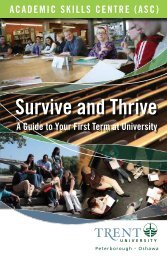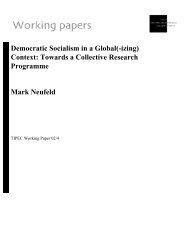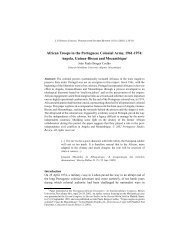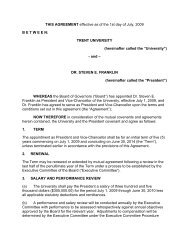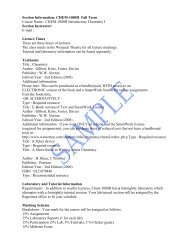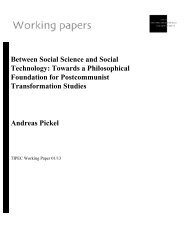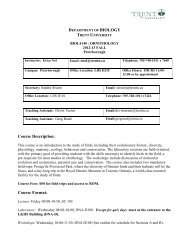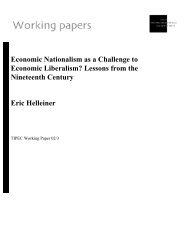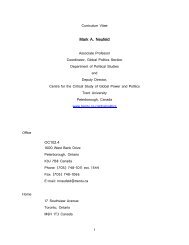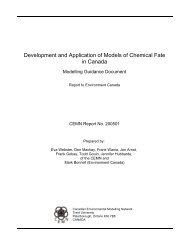Writing the essay question
Writing the essay question
Writing the essay question
Create successful ePaper yourself
Turn your PDF publications into a flip-book with our unique Google optimized e-Paper software.
Academic Skills Centre (2009)<br />
www.trentu.ca/academicskills<br />
Similarities<br />
A. both have intellectual interests<br />
- L'dum's chamber music & L'dee's kazoo<br />
- both read Russian novels, in Russian<br />
B. superficial resemblance<br />
- both look like jerks<br />
- wear beanies<br />
- answer to Tweedle<br />
Differences<br />
A. Political - one a Trot, <strong>the</strong> o<strong>the</strong>r a Jimmy<br />
Swaggart supporter<br />
B. Financial<br />
- L'dum's dismay at T'dee's contributions to<br />
religious broadcasters<br />
- L'dee's dismay at L'dum's contributions to<br />
<strong>the</strong> Party<br />
Argue Questions. All <strong>essay</strong>s are forms of argument in <strong>the</strong> general sense of being<br />
developed from a premise towards a conclusion via a structure of support built on logic<br />
and evidence. Some, though, are argumentative in <strong>the</strong> more common sense of requiring<br />
that a position be defended against potential detractors. “Prove that Francis Bacon wrote<br />
what goes by <strong>the</strong> misnomer, <strong>the</strong> Shakespearean canon.”<br />
Assess Questions. Just as all <strong>essay</strong> <strong>question</strong>s require an answer in <strong>the</strong> form of an<br />
argument, all require that <strong>the</strong> writer exercise his judgement or powers of discrimination in<br />
determining what is relevant or not, significant or not, au<strong>the</strong>ntic or not. “Assess”<br />
<strong>question</strong>s require that judgement become <strong>the</strong> focus and purpose of <strong>the</strong> <strong>essay</strong>. Thus,<br />
“Evaluate Thought, Action and Passion in its attempt to describe <strong>the</strong> interrelationships<br />
among various disciplines.” One is frequently asked to measure degree, to answer, “How<br />
well?” To do this, sensible criteria must be established against which to judge <strong>the</strong> subject<br />
in <strong>question</strong>, and <strong>the</strong>n one’s judgement must be defended.<br />
Sketch <strong>the</strong> answer. Take a few minutes at <strong>the</strong> beginning of each <strong>question</strong> to jot down<br />
your main ideas on <strong>the</strong> blank side of <strong>the</strong> examination booklet. Approximately five<br />
minutes for a half-hour <strong>question</strong> should be about right. A little sketch, remember: an<br />
outline that turns into a rough draft is a luxury that is normally not worth <strong>the</strong> time on an<br />
exam. Use whatever outlining method you are comfortable with — mind map or<br />
conventional hierarchical structure. 2 Don’t abandon hope if you feel your answer is<br />
incomplete or lacks focus. Instead, see what you can come up with, and invent a <strong>the</strong>sis<br />
that makes good use of it.<br />
<strong>Writing</strong> your response<br />
Once you’ve outlined your argument, you are ready to begin writing. In your <strong>essay</strong><br />
answer:<br />
Aim to produce <strong>the</strong> Grateful Examiner. Whatever <strong>the</strong> <strong>question</strong>, try to answer it in an<br />
organized way. Remember that your professor is reading dozens and dozens of exam<br />
papers, most of which display student writing — and student handwriting — at its very<br />
worst. Therefore, write reasonably neatly, every o<strong>the</strong>r line, in visible ink, and show<br />
intelligence at all costs. If you can’t address <strong>the</strong> topic, come as close as possible. This<br />
2 For an extensive discussion of outlines, see Thinking It Through, 91-107.<br />
From Making your Mark: Learning to Well on Exams.<br />
Ca<strong>the</strong>rine Taylor, Hea<strong>the</strong>r Avery and Lucille Strath: ASC, Trent U. (1994).



